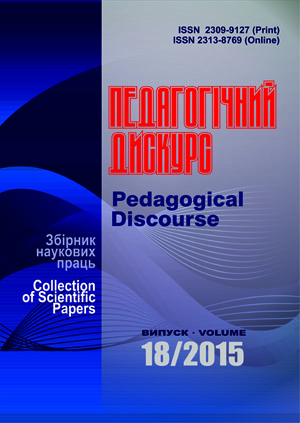Conceptual Foundations of Hedonistic Orientation of Music Students’ Vocal Training
Abstract
The problem of the article is to develop and validate the conceptual foundations that underlie the mechanism of hedonistic directions of music students’ vocal training in pedagogical universities. This relates directly to the ideas of holism, axiology and eutimnity.
Implementation of the idea of holism identifies ways of the organization of vocal training from the point of view of ensuring the integrity of personality of students, which is seen as a multidimensional phenomenon, able for development and which incorporates dynamic variety of spiritual, psychological, mental and physiological aspects of human nature. The process of vocal training has less to do with evolutionary (quantitative) changes, but with emergentism (qualitative) changes in the professional development of students. This pattern is achieved by certain determinants, the role of which performs a hedonistic background of personal experiences of the future specialists.
In accordance with the idea of axiology in the process of vocal training of students, there is awareness that they value the importance of hedonic experiences (pleasure, enjoyment, joy, interest, desire, lust, delight, happiness, etc.), which are the criteria of satisfaction of students’ needs (in learning, self-knowledge, creativity, achievement of the physiological harmony, in communication, etc.), as well as the regulator of their motivational sphere; stimulant factor of creative activity.
Hedonistic imperative finds its embodiment in the orientation of cognitive and behavioral strategies of students to enjoy and achieve wellbeing in the context of introduction of the idea of eutimnity. Such direction of vocal training of students will be ensured by the introduction of a set of tasks designed to ensure that future professionals not only understand, but can be convinced on their own experience that the learning process can bring pleasure, delight and joy.
Downloads
References
Derevianko L. A. Osoblyvosti formuvannia vokalno-movlennievoi kultury yak skladovoi pedahohichnoi maisternosti maibutnoho vchytelia, Kyiv, 1993, 16 p.
Dodonov B. I. E’mociya kak cennost’, Moscow, Politizdat, 1978, 272 p.
Matveieva O. V. Koordynatsiia nadiinosti spivu maibutnikh uchyteliv muzyky v konteksti emotsiinoi teorii kohnityvnoho dysonansu, Ideia opiky ditei i molodi v istoryko-pedahohichnii nautsi, Ivano-Frankivsk, 2005, pp. 78–82.
Priadko O. M. Rozvytok spivatskoho holosu, Kamianets-Podilskyi, PP Buinyts’kyi О. А., 2009, 92 p.
Stasko H. Ye. Vokalna pidhotovka maibutnoho vchytelia muzyky yak osnova udoskonalennia pedahohichnoi maisternosti, Kyiv, 1995, 192 p.
Yutsevich Yu. Ye. Teoriia i metodyka formuvannia spivatskoho holosu, Kyiv, IZMN, 1998, 160 p.
Yaspers K. Smy’sl i naznachenie istorii, Moscow, Politizdat, 1991, 527 p.

This work is licensed under a Creative Commons Attribution-NonCommercial-ShareAlike 4.0 International License.

















